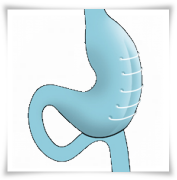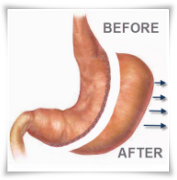Gastric Sleeve Recovery
After surgery, your gastric sleeve recovery will require patience and a strong commitment just like any other type of bariatric surgery. The recovery period is crucial to your weight loss success, so you must follow the advice of your surgeon, your doctor, and your dietician during gastric sleeve recovery. Your weight loss team is there to help you lose the weight quickly and safely, and will help to avoid any unwanted complications, so it is very important that you strictly adhere to the guidelines and advice that they give you. There will still be some tests to be done, and behavioral changes to be made for you to get the best results.
Click here to read more about the Gastric Sleeve.
Gastric Sleeve Recovery – An Overview
After undergoing surgery, here is a brief outline of what you can expect during your gastric sleeve recovery period:
- Initial Gastric Sleeve Recovery Period – 2 day stay in a hospital under monitored care
- Liquid Diet for the first 14 days following surgery
- A Slow progression from a liquid diet to solid foods will take approximately 6 to 8 weeks
- On-Going Gastric Sleeve Recovery will mean a slow progression back to your normal activities
- Follow Up Appointments with your doctor are important to monitor your progress and gastric sleeve recovery
- Changing Your Eating Habits to help promote weight loss and keep your body healthy
- Watch for any Side Effects
- Lose up to 60% of the fat within 12 months, and 80% of the fat after 24 months
Gastric Sleeve Recovery – Initial Recovery
 After you’ve had gastric sleeve surgery, you can expect to stay in the hospital for about 2 days for the initial gastric sleeve recovery period. The abdomen is often swollen and sore for several days, but your surgeon will prescribe pain medication to manage any discomfort you may experience during the initial gastric sleeve recovery period.
After you’ve had gastric sleeve surgery, you can expect to stay in the hospital for about 2 days for the initial gastric sleeve recovery period. The abdomen is often swollen and sore for several days, but your surgeon will prescribe pain medication to manage any discomfort you may experience during the initial gastric sleeve recovery period.
While you are recovering in hospital, medical staff will run a few tests to ensure that your gastric sleeve recovery is smooth and uneventful. One test that would most likely doctors will do is to check your gastro intestinal tract. This is to make sure that the GI tract is ok and recovering well. They will also monitor your heart rate, and your blood pressure to ensure there are no complications with your gastric sleeve recovery.
During this time, you will only be allowed to ingest liquids, and you will be on a liquid diet for the first 14 days of your gastric sleeve recovery. This is to reduce the amount of stress on your stomach. Eating solid foods right after surgery can cause the sealed stomach to leak or open up, which can cause many complications and damage organs close to your stomach. When you have knee surgery, or a broken arm, you must allow it time to heal before you can begin to use it normally, the same applies to your stomach, so take it easy on your tummy and stick to your diet.
Gastric Sleeve Recovery – On-Going Recovery
The gastric sleeve recovery time it takes for your stomach to fully heal can be anywhere from 3 to 9 months, it varies from patient to patient. You will feel some discomfort after surgery, but that should slowly diminish each day, and each day you will feel a little bit better every day of your gastric sleeve recovery.
Physical Activity
Under no circumstances should you do any strenuous activity. You just had surgery, and any unnecessary stress can cause the wound to reopen, or the stomach can begin to leak. That means no lifting heavy objects, no running, no hardcore physical workouts, no strenuous activity of any kind for the first couple weeks of your gastric sleeve recovery. You should listen to your doctor, when they advise you that it is ok to exercise and put some stress on your body, that is the time that you may start…and even then you need to take it slow. Your gastric sleeve recovery is to be done in small steps, not huge leaps, this gives your body the time it needs to completely heal.
We would suggest that instead of working out, that you do some walking instead. This will help to keep the blood circulating, and it will also help you develop a good habit of getting some low-impact exercise. Once your body has completely healed, you can step it up a bit and walk longer and farther, but of course you must listen to the advice of your doctor regarding any physical activity to ensure a safe gastric sleeve recovery.
Gastric Sleeve Recovery – Follow Up
Follow up appointments with your bariatric surgeon or your doctor are very important to your gastric sleeve recovery. They must check up on you every so often to make sure the stomach is healing properly, that there are no complications with your gastric sleeve recovery, and that you are losing the weight safely. This is also a time that you can ask questions, or let your doctor know about any side effects you may be experiencing. Side effects can help your doctor diagnose any problems with your gastric sleeve recovery. It is better to diagnose a problem and resolve it early on, before it becomes a major health risk, that may require a second operation. Your doctor will provide you with a schedule of follow up appointments so make sure you stick to that schedule.
Gastric Sleeve Recovery – Diet & Eating
The Diet
As mentioned above, you will be on a liquid diet for the first 14 days of your gastric sleeve recovery period, and you will need to become re-used to eating solid foods, but slowly. Normally this starts with:
- 2 weeks on a liquid diet
- 2 weeks of pureed foods
- 2 weeks of semi-solid foods
- 2 weeks of soft solid foods
- Back eating normal foods
You can see the progression from liquids to normal foods, but remember that you must make this adjustment gradually.
Click here to read more about Eating After Gastric Sleeve Surgery.
Changing Your Eating Habits
During the gastric sleeve recovery period, and even afterwards, the type of food you eat is important as well. Your stomach is smaller, which means you can only take in so much food, so you had better make sure you are eating healthy foods. Don’t overdo it with fatty, oily or sugary foods, these will not provide your body with the nutrients it needs, so eat healthy both during and after your gastric sleeve recovery period.
Remember that your stomach is much smaller now, it cannot hold as much food as it used to, so you must reduce your food intake per meal. You need to avoid overeating as you might being to feel sick, nauseated, and may end up vomiting…not to mention you may gain the weight back over time, so eat as directed. Listen also to your body, when it tells you that it is full, stop eating.
You should also note that if you constantly overeat, it can cause the stomach may stretch over time. A bigger stomach means you can eat more food, and more food can lead to gaining back those unwanted pounds…which defeats the purpose of the gastric sleeve.
Eating properly is just as important as the quantity of food. You must chew your food very well. Most dieticians will advise you that the consistency should be like of an apple sauce to avoid malabsorption, which will usually result in nausea and vomiting.
A good tip to help you eat less is to use smaller cutlery, smaller dishes and smaller glasses. This will give the illusion that you are eating a big meal, but it just looks big. This will help you to psychologically eat less, and train yourself to eat less. This is part of the behavior modification process.
Gastric Sleeve Recovery – Possible Side Effects
Although losing all that excess weight can be exciting, there are side affects you should be aware of. These side effects can seem like a flu. You might feel tired and achy during the gastric sleeve recovery period. There may be also mood changes, as well as loose skin because of weight loss. You can tell your doctor about any issues you are having during or after your gaastric sleeve recovery such as any feeling of hotness, chills, or problems digesting food during your follow up appointments.
Click here to read more about the Downsides to Gastric Sleeve Surgery.
Gastric Sleeve Recovery – The Weight Loss
All this information about the gastric sleeve recovery period, eating, exercising, follow up…but what about the weight loss? This is what you’re really after right?
Within 12 months many patients lose 60% of the excess weight. After 24 months many patients have lost about 80% of that excess weight. As long as you stick to your diet, and listen to the advice of your doctor, you can achieve this too!
There is a small percentage of patients who have undergone gastric sleeve surgery that don’t shed any significant weight, but this is usually because those patients refuse to change their eating habits and still eat those high-calorie, sugary foods. You must be committed to losing weight and to making changes to improve your health, but if you’re not willing to make those lifestyle changes, then the surgery will be a waste of your time (and money) and the weight loss won’t achieved.
Undergoing gastric sleeve surgery can be life-changing, and the gastric sleeve recovery can be a pain at first, but within a few weeks you can go back to your daily routine. If you have tried every exercise and every diet and still have not been able to lose the excess weight, then gastric sleeve surgery is the best option. After surgery, it is extremely important that you follow your doctor’s advice to make sure you can lose that unwanted fat, and have a smooth, uneventful gastric sleeve recovery.

